Related Research Articles
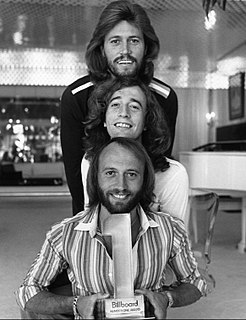
The Bee Gees were a music group formed in 1958, featuring brothers Barry, Robin, and Maurice Gibb. The trio were especially successful as a popular music act in the late 1960s and early 1970s, and later as prominent performers of the disco music era in the mid- to late 1970s. The group sang recognisable three-part tight harmonies; Robin's clear vibrato lead vocals were a hallmark of their earlier hits, while Barry's R&B falsetto became their signature sound during the mid- to late 1970s and 1980s. The Bee Gees wrote all of their own hits, as well as writing and producing several major hits for other artists. The Bee Gees have occasionally been referred to as The Disco Kings.

Maurice Ernest Gibb was a British musician, singer, songwriter and record producer who achieved fame as a member of the Bee Gees. Although his elder brother Barry Gibb and fraternal twin brother Robin Gibb were the group's main lead singers, most of their albums included at least one or two songs featuring Maurice's lead vocals, including "Lay It on Me", "Country Woman" and "On Time". The Bee Gees were one of the most successful rock-pop groups of all time.

Sir Barry Alan Crompton Gibb is a British-American musician, singer-songwriter and record producer who rose to worldwide fame as a co-founder of the group the Bee Gees, one of the most commercially successful groups in the history of popular music. With his younger brothers, twins Robin and Maurice Gibb, he formed a songwriting partnership beginning in 1955. He has lived in Britain, Australia, and the United States, holding dual UK–US citizenship, the latter since 2009.

Cucumber Castle is the seventh studio album by the Bee Gees, released in April 1970. It was produced by Barry Gibb, Maurice Gibb, and Robert Stigwood. It consists of songs from their television special of the same name, which was named after a song on their 1967 album Bee Gees' 1st. Cucumber Castle is the only Bee Gees album not to feature any recorded contributions from Robin Gibb, as he had left the group before the album was recorded.
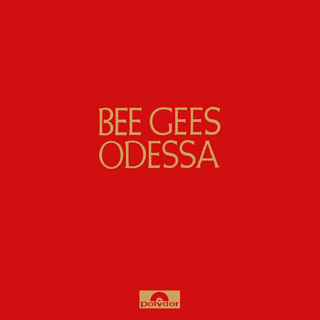
Odessa is the sixth studio album by the Bee Gees, a double vinyl LP released on 30 March 1969, initially in an opulent red flocked cover with gold lettering. Despite reaching the UK Top Ten and the US Top 20, the album was not particularly well-received, though now is regarded by many as the most significant of the group's Sixties albums. An ambitious project, originally intended as a concept album on the loss of a fictional ship in 1899, it created tension and disagreements in the band regarding the work's direction; finally, a dispute over which song to release as a single led to Robin Gibb temporarily leaving the group.

Horizontal is the fourth studio album by the Bee Gees, and their second album to receive an international release. The LP was released in early 1968, and included the international hit singles "Massachusetts" and "World". On 5 February 2007, Reprise Records reissued Horizontal with both stereo and mono mixes on one disc and a bonus disc of unreleased songs, non-album tracks, and alternate takes. The album was released in Polydor in many countries and on Atco only in the US and Canada. "And the Sun Will Shine" was released as a single only in France. The influences displayed on the album range from the Beatles to baroque pop.
Ronald Leslie BurnsAM is an Australian rock singer-songwriter and musician. He fronted the Melbourne band "The Flies" in the early 1960s, followed by a solo career into the 1970s and was a member of Burns Cotton & Morris in the 1990s. He retired from performing in 2000. His solo hit single, "Smiley" peaked at number two on the Go-Set National Top 40 in 1970. On 10 June 2013 Burns was awarded a Member of the Order of Australia with the citation "For significant service to the community, particularly to children recovering from illness and trauma, and to the entertainment industry".
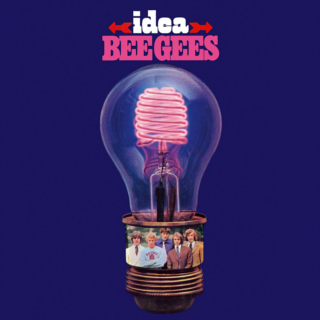
Idea is the fifth album by the Bee Gees. Released in September 1968, the album sold over a million copies worldwide. The album was issued in both mono and stereo pressings in the UK. The artwork on the Polydor release designed by Wolfgang Heilemann featured a "beehive" neon lightbulb with a group photo in its base, while the North American ATCO release designed by Klaus Voormann featured a composite head made from each band member. It was their third internationally released album - the first two albums being released only in the Australian market.
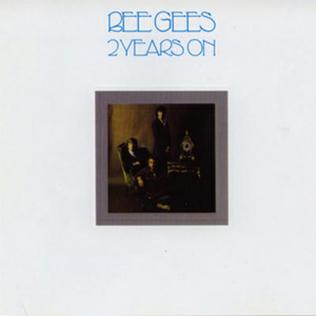
2 Years On is the eighth studio album by the Bee Gees, which reached No. 32 on the US charts. Released in 1970, the album saw the return of Robin Gibb to the group after an earlier disagreement and subsequent split following Odessa. 2 Years On was the first album with drummer Geoff Bridgford, who remained a full-time member of the group until 1972 although he was not pictured on the sleeve. The best-known track is "Lonely Days". Released as the first single by the reunited brothers, it charted high in the US, but peaked at No. 33 in the United Kingdom.

"How Can You Mend a Broken Heart" is a song released by the Bee Gees in 1971. It was written by Barry and Robin Gibb and was the first single on the group's 1971 album Trafalgar. It was their first US No. 1 single and also reached No. 1 in Cashbox magazine for two weeks.
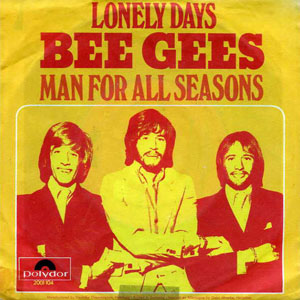
"Lonely Days" is a ballad written and performed by the Bee Gees. It appeared on their album 2 Years On, and was released as a single, becoming their first Top Five hit in the US, peaking at number three in the Billboard Hot 100 and reaching number one in the Cashbox and Record World charts. Barry Gibb later re-recorded the song with country quartet Little Big Town for his 2021 album Greenfields.
"World" is a song by the Bee Gees, released in 1967 as a single in the United Kingdom and Europe and then included on their album Horizontal the following year. Though it was a big hit in Europe, Atco Records did not issue it as a single in the United States, having just issued a third single from Bee Gees' 1st, "Holiday".

"Don't Wanna Live Inside Myself" is a ballad written and sung by Barry Gibb, and released on the Bee Gees' album Trafalgar in 1971, and the second single release taken from the album.

"My World" is a 1972 single released by the Bee Gees. It was originally released as a non-album single on 14 January 1972 worldwide. but was later included on the compilation Best of Bee Gees, Volume 2 in 1973. The flip side of the single was "On Time", a country rock number composed by Maurice Gibb. "My World" reached the Top 20 in both US and UK.

"Run to Me" is a song by the Bee Gees, the lead single and first track on the group's album To Whom It May Concern (1972). The song reached the UK Top 10 and the US Top 20.
"Bury Me Down By the River" is a song written by Barry and Maurice Gibb and recorded separately by the Bee Gees and P.P. Arnold. The Bee Gees' version was recorded in May 1969 at IBC Studios and released in April 1970 on the album Cucumber Castle.

The Kid's No Good was to have been the debut solo album by British musician Barry Gibb following his departure from the Bee Gees, in December 1969. There was no official title given to the album at the time. The line "the kid's no good", which the album is commonly titled on several bootleg releases, is also featured in the Bee Gees song "Come Home Johnny Bridie" on the 1973 album Life in a Tin Can. The album features orchestral arrangements by Bill Shepherd who performed the same role for the Bee Gees from 1965 to 1972.

"Hold Her in Your Hand" is a country ballad recorded by Maurice Gibb; it was his second and last single after "Railroad" in 1970. Samantha Gibb, the daughter of Maurice, recorded an acoustic version that was independently released on CD in 2013.

"Morning of My Life" is a song written by Barry Gibb in 1965 whilst in the town of Wagga Wagga, Australia and later recorded by the Bee Gees and several other artists. It was recorded in 1966 during sessions for the album Spicks and Specks, and later was released as the opening track on the compilation Inception/Nostalgia in 1970. The first recording of the song to be released by any artist was by Ronnie Burns, first as a B-side to his Exit, Stage Right single in June 1967 and a month later on his Ronnie LP.
Inception/Nostalgia is a 1970 compilation album of previously unreleased songs recorded by the Bee Gees in 1966. This double album contains a mixture of both self-penned songs and covers. The first LP in the set is titled Inception while the second LP is titled Nostalgia, hence the album title. Supposedly intended as a follow-up to the three volumes of Rare, Precious and Beautiful this set was first issued by Karussell in Germany and by Triumph in France, both being Polydor budget labels and therefore linked to their licensing deal with Festival Records. The Gibb brothers were unaware of its release until Maurice saw one during a skiing holiday in Switzerland. It did not remain in print for long but it was released by Polydor in Japan in 1972 as Inception and Nostalgia and a number of single disc releases with a varying selection of these songs appeared on a number of compilations across the world over the next few years.
References
- ↑ Brennan, Joseph. "Gibb Songs: 1969" . Retrieved 2 February 2013.
- 1 2 "One Bad Thing - Wildwood / Ronnie Burns / The Freshmen / New Horizon". Poparchives.com.au. Archived from the original on 20 March 2012. Retrieved 20 January 2013.
- ↑ "45 discography for ATCO Records". Globaldogproductions. Retrieved 1 January 2014.
- ↑ "Barry Gibb - One Bad Thing / The Day Your Eyes Meet Mine". Rateyourmusic.com. Retrieved 8 December 2014.
- ↑ Brennan, Joseph. "Gibb Songs: 1970" . Retrieved 2 February 2013.
- ↑ Bennett, Kevin (7 April 2011). "Bee Gees Demos - Part 6" . Retrieved 10 April 2013.
- ↑ "Bee Gees story" . Retrieved 5 March 2013.
- ↑ Bilyeu, Cook & Hughes 2009.
- ↑ "45cat - New Horizon - One Bad Thing / Cider Rosie". 45cat. Retrieved 6 March 2015.
- ↑ "Ronnie Burns Biography". MILESAGO. Retrieved 3 January 2014.
- ↑ "45cat - The Freshmen - One Bad Thing". 45cat. Retrieved 6 March 2015.